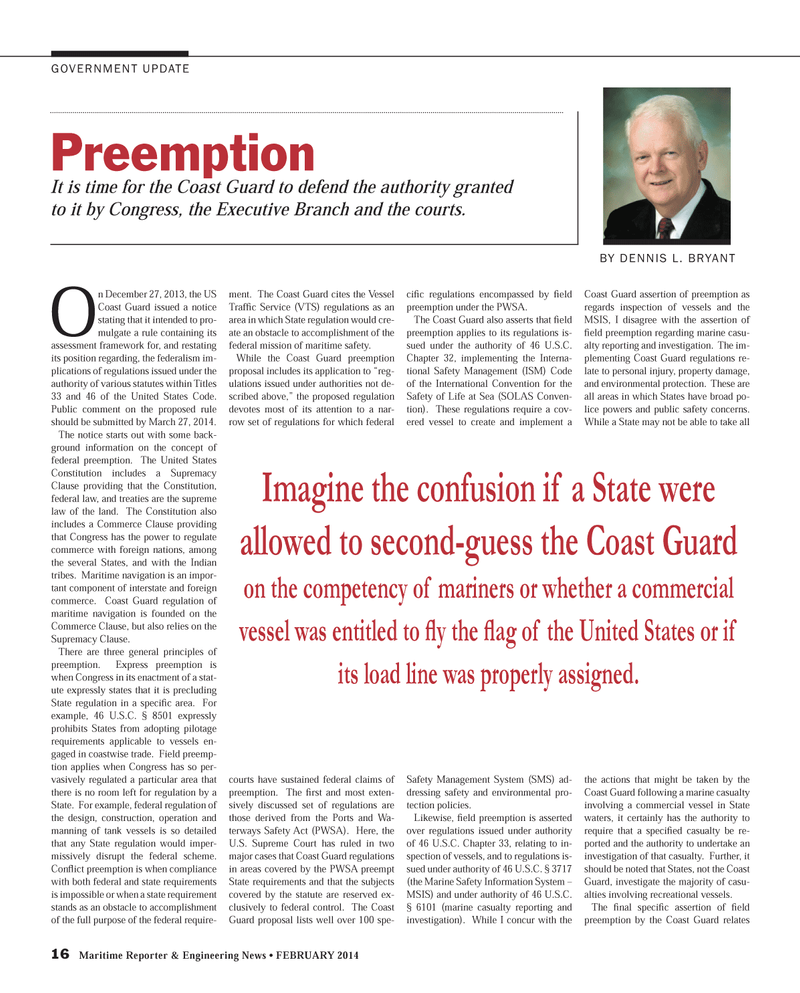
Page 16: of Maritime Reporter Magazine (February 2014)
Cruise Shipping Edition
Read this page in Pdf, Flash or Html5 edition of February 2014 Maritime Reporter Magazine
16 Maritime Reporter & Engineering News • FEBRUARY 2014
GOVERNMENT UPDATE
O n December 27, 2013, the US
Coast Guard issued a notice stating that it intended to pro- mulgate a rule containing its assessment framework for, and restating its position regarding, the federalism im- plications of regulations issued under the authority of various statutes within Titles 33 and 46 of the United States Code.
Public comment on the proposed rule should be submitted by March 27, 2014.
The notice starts out with some back- ground information on the concept of federal preemption. The United States
Constitution includes a Supremacy
Clause providing that the Constitution, federal law, and treaties are the supreme law of the land. The Constitution also includes a Commerce Clause providing that Congress has the power to regulate commerce with foreign nations, among the several States, and with the Indian tribes. Maritime navigation is an impor- tant component of interstate and foreign commerce. Coast Guard regulation of maritime navigation is founded on the
Commerce Clause, but also relies on the
Supremacy Clause.
There are three general principles of preemption. Express preemption is when Congress in its enactment of a stat- ute expressly states that it is precluding
State regulation in a specifi c area. For example, 46 U.S.C. § 8501 expressly prohibits States from adopting pilotage requirements applicable to vessels en- gaged in coastwise trade. Field preemp- tion applies when Congress has so per- vasively regulated a particular area that there is no room left for regulation by a
State. For example, federal regulation of the design, construction, operation and manning of tank vessels is so detailed that any State regulation would imper- missively disrupt the federal scheme.
Confl ict preemption is when compliance with both federal and state requirements is impossible or when a state requirement stands as an obstacle to accomplishment of the full purpose of the federal require- ment. The Coast Guard cites the Vessel
Traffi c Service (VTS) regulations as an area in which State regulation would cre- ate an obstacle to accomplishment of the federal mission of maritime safety.
While the Coast Guard preemption proposal includes its application to “reg- ulations issued under authorities not de- scribed above,” the proposed regulation devotes most of its attention to a nar- row set of regulations for which federal courts have sustained federal claims of preemption. The fi rst and most exten- sively discussed set of regulations are those derived from the Ports and Wa- terways Safety Act (PWSA). Here, the
U.S. Supreme Court has ruled in two major cases that Coast Guard regulations in areas covered by the PWSA preempt
State requirements and that the subjects covered by the statute are reserved ex- clusively to federal control. The Coast
Guard proposal lists well over 100 spe- cifi c regulations encompassed by fi eld preemption under the PWSA.
The Coast Guard also asserts that fi eld preemption applies to its regulations is- sued under the authority of 46 U.S.C.
Chapter 32, implementing the Interna- tional Safety Management (ISM) Code of the International Convention for the
Safety of Life at Sea (SOLAS Conven- tion). These regulations require a cov- ered vessel to create and implement a
Safety Management System (SMS) ad- dressing safety and environmental pro- tection policies.
Likewise, fi eld preemption is asserted over regulations issued under authority of 46 U.S.C. Chapter 33, relating to in- spection of vessels, and to regulations is- sued under authority of 46 U.S.C. § 3717 (the Marine Safety Information System –
MSIS) and under authority of 46 U.S.C. § 6101 (marine casualty reporting and investigation). While I concur with the
Coast Guard assertion of preemption as regards inspection of vessels and the
MSIS, I disagree with the assertion of fi eld preemption regarding marine casu- alty reporting and investigation. The im- plementing Coast Guard regulations re- late to personal injury, property damage, and environmental protection. These are all areas in which States have broad po- lice powers and public safety concerns.
While a State may not be able to take all the actions that might be taken by the
Coast Guard following a marine casualty involving a commercial vessel in State waters, it certainly has the authority to require that a specifi ed casualty be re- ported and the authority to undertake an investigation of that casualty. Further, it should be noted that States, not the Coast
Guard, investigate the majority of casu- alties involving recreational vessels.
The fi nal specifi c assertion of fi eld preemption by the Coast Guard relates
Preemption
It is time for the Coast Guard to defend the authority granted to it by Congress, the Executive Branch and the courts.
BY DENNIS L. BRYANT
Imagine the confusion if a State were allowed to second-guess the Coast Guard on the competency of mariners or whether a commercial vessel was entitled to fl y the fl ag of the United States or if its load line was properly assigned.
MR #2 (10-17).indd 16 2/3/2014 1:36:20 PM

 15
15

 17
17
